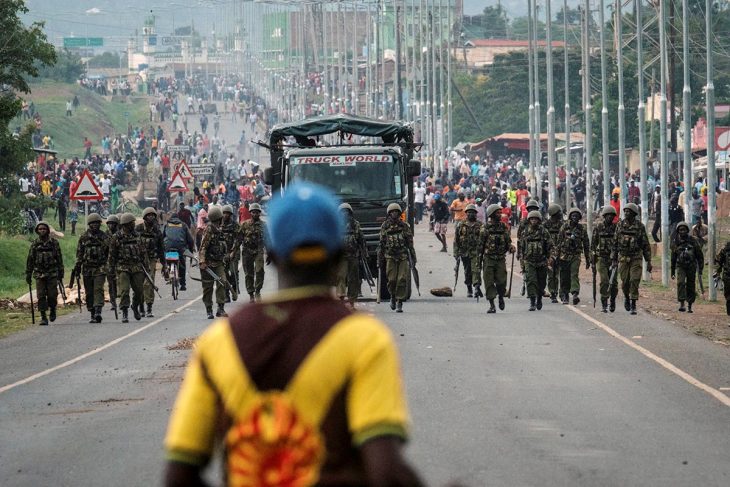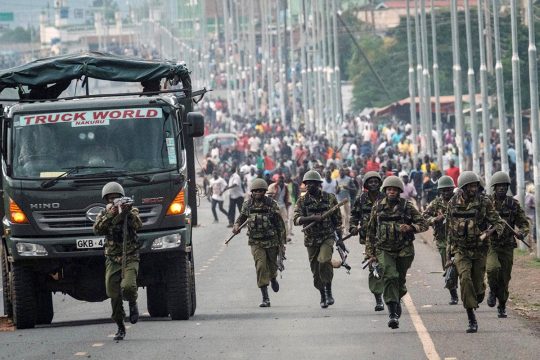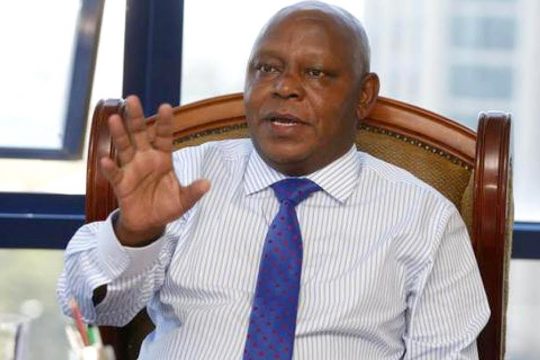Following the 2007 presidential election, demands were high in Kenya to bring to justice the perpetrators of the violence that engulfed the country. Similar demands were also made after the violence that followed 2017 presidential election.
Only last Monday, November 14, the Office of the Director of Public Prosecutions (ODPP) presented nine police officers in court to be charged with murder, rape and torture as crimes against humanity. The officers were granted bail and, together with three other who were not in court, they will take their pleas next week.
This development follows the October 28 announcement by the Director of Public Prosecutions (DPP) Noordin Haji that he had decided to charge senior police officers with crimes against humanity for their alleged roles in the violence that followed the August 2017 presidential election. In his statement, he said a key peg of the case against the police officers will be their “superior/command responsibility.”
The charges against the 12 police officers are based on the International Crimes Act, which makes the Rome Statue of the International Criminal Court (ICC) domestic law. This is the first time it is being used to take to trial suspected perpetrators of electoral violence in Kenya, after the collapse of the Kenyan case at the ICC, which dealt with the 2007 post-election violence.
This case comes at a time the national police is in transition, with changes in its top leadership in the past two months. The police have faced criticism for their alleged role in extrajudicial killings, from no less a person than recently elected President William Samoei Ruto.
But at the same time Haji announced the charges in October, he also asked the courts to close a number of high-profile corruption cases that involved allies of Ruto. This has raised speculation about Haji’s independence as a prosecutor.
A number of firsts for Kenya
The case against the 12 police officers presents a number of firsts for Kenya. This will be the first-time a crime against humanity case will be prosecuted in Kenya. The charges against them represents the first-time senior police officers will be held to account in court for command decisions they took while on duty. It is also the first-time senior police officers will be charged with sexual violence.
As Haji marks a number of firsts for his office, a question arises: why did he decide pursue this case now, five years after the violence the officers are alleged to have been involved took place?
He said in his October 28 statement that he took the decision to develop a crimes against humanity case against senior police officers after Senior Resident Magistrate Beryl Omollo made recommendations in a February 14, 2019 ruling in the investigation into the death of Samantha Pendo, a six-month old baby. Pendo was injured on August 12, 2017 when police clobbered her parents outside their home with batons. She later died from her injuries.
Pendo’s death made headline news and drew public outrage. The Independent Policing Oversight Authority (IPOA) investigated her death but was unable to pinpoint the responsible. Haji’s predecessor, Keriako Tobiko, then ordered in November 2017 an inquest into Pendo’s death.
Omollo was also unable to pinpoint who was directly responsible for Pendo’s death. But she recommended the DPP take action against officers who commanded the police operation in Nyalenda, an informal settlement of Kisumu, in western Kenya, naming five men against whom action should be taken.
“Guided by the legal principles [of] the doctrine of command responsibility … the superiors should therefore incur liability for the subordinate’s unlawful conduct by failing to take any action to redress the situation,” said Omollo in her ruling.
Long and complicated process
“It has been a complex process of investigations and legal analysis, but it’s been a fruitful journey and partnership,” said Li Fung, Senior Human Rights Adviser for the UN High Commissioner on Human Rights (OHCHR) in Kenya. In 2019, Haji requested the support of the OHCHR to enhance the capacity of his office to prosecute human rights violations. The UN agency accepted his request and has supported capacity building and case mentoring to help Haji’s office and IPOA strengthen the investigation and prosecution of human rights violations.
Another reason that may explain why Haji took three years to charge the officers was he expanded the investigation beyond the five officers Omollo named in her inquest ruling and beyond the informal settlement of Nyalenda where Pendo was injured. In his October 28 statement, Haji said his team established that between August 11 and August 15, 2017 there was a post-election operation called “Mipango” (Swahili for arrangements) under which the officers “committed atrocities.”
Haji further said that the operation, “had a well-organised command structure with section commanders and was executed according to a consistent pattern with similar victims and a similar modus operandi.” He said the attacks were “widespread and systematic against the civilian population of Nyalenda, Nyamasaria, Kondele and Obunga.” All of these locations are in Kisumu. Haji added that the attacks were “coordinated and planned and not random.”
As this case progresses, Haji will be under a lot of scrutiny to see whether he falters. The case against the 12 police officers covers only the post-election violence that happened in Kisumu between August 11 and August 15, 2017.
During the same period, post-election violence also occurred in Nairobi, according to a report of the Kenya National Commission on Human Rights, Mirage at Dusk, which recorded 37 deaths in Nairobi and Kisumu during that violence. In a separate report, Silhouettes of Brutality, the commission investigated 201 sexual violence cases in 11 of Kenya’s 47 counties.
Haji’s predecessor, Keriako Tobiko, had also ordered an investigation into the death of Stephanie Moraa Gesamba, a nine-year old girl who was killed in Mathare, Nairobi on August 12, 2017. It is only last year on March 15 that Nairobi Chief Magistrate Francis Andayi ruled that Moraa Gesamba was shot by police as she played on the balcony of the apartment she lived in with her parents. Haji has not made public comments about any action he will take on that ruling.
Last Monday, after the first hearing on the Baby Pendo case, Judge Daniel Ogembo ordered the suspects to return to court on November 21, to answer charges of murder.







